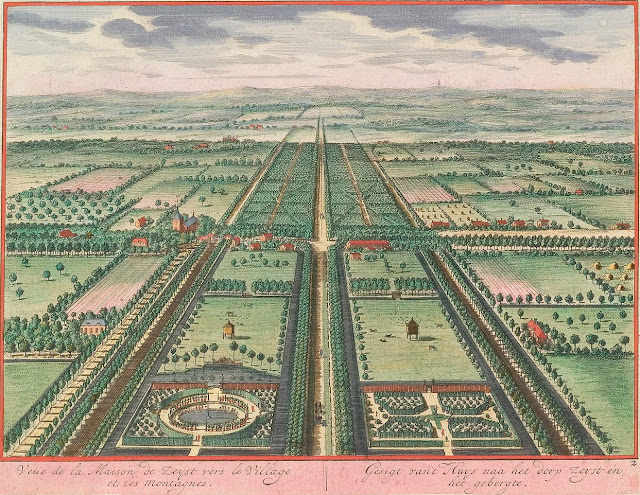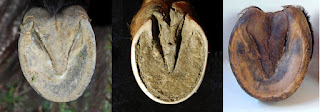Some of the choices I made translating Oera Linda are very different from the ones made by earlier translators. Here is one example, with some explanation.
[143/28] chapter 16a. Canals and Dykes (longer fragment below)
THÉR THJU DÁNTE HETH FON EN HOF
Ottema (1872, 1876, p. 195): die de gedaante heeft van een hoef (i.e. hoof)
Sandbach (1876, p. 195): which has the form of a hoof
Wirth (1933): welche die Gestalt eines Hufes hat (i.e. hoof)
Overwijn (1941, p. 147): as Ottema
Jensma (2006): as Ottema*
[* added note: hier wordt de naam 'Oldehove' (de jongste van de drie terpen waarop Leeuwarden werd gebouwd) verklaard uit 'Oude hoef' (...)]
Lien (2013): som har form av en hov (i.e. hoof)
Menkens (2013): der die Form eines Hufes hat (i.e. hoof)
Ott (2022): which is like unto a palace garden
How should we interpret a domain or piece of land with the shape or form of a hoof? If the imprint of a horse's hoof was ment, it could make sense; the triangular shape may represent a building, while the outer shape may be the surrounding domain, fenced by dike, wall or canal. However, nowhere else in Oera Linda is HOF/ HOV- used for hoof. It is used in two distinct contexts: 1) related to the residence of a monarch (court), an ornamental garden or perhaps a farm; 2) from verb (BI-)HOVA (Dutch hoeven - need, have to, behove), mostly noun BIHOF - needs, necessities. All fragments are listed below.
Still, HOF may very well (also, or in the first place) have been the original word for hoof, considering these cognates:
hoof - English ("A hoof [...] is the tip of a toe of an ungulate mammal [...]" - wiki)
hoef - Dutch, Afrikaans
Huf - German
hov - Danish, Swedish, Norse
hófur - Icelandic
1. related to palace, court
cognates: hof, hoeve - Dutch; Hof - German
HOVE - 1,4,6
HOVA - 2,7,8
HOF - 3,5
1) [00b] B. Liko Ovira Linda, 803 CE
IK HÀV BI THAM ET HOVE WÉST
I have visited their palace
2) [078] 10b. Athenia: Miscegenation and Decadence
THÉR BEFTHA HÁGA WALLUM FON LÁF THA FON STÉN BVWADON HJA HOVA MITH KESTLIK HUSARK
There, behind high walls of leaf or stone, they built richly furnished mansions
3) [088] 12. Adelbrost: Intrigues and Division
HETH WÉRE SIN TORN VMBE VPPINETH GRÁTE HOF TO DOK.HÉM TO HÉMANDE
He had been allowed to live in the palace of Dokhem
4) [126] 14e. Demetrius and Friso
MEN AS DEMÉTRIUS HIRA SVN SA. LÉT.ER THAM NÉI SINRA HOVE FORA
But when Demetrius saw her son, he had him taken to his palace
5) [143] 16a. Canals and Dykes
THRVCH SLÁTA TO DELVANE ÀND KÁDIKA TO MÁKJANE FON THA GRVND THÉR ÛT.A SLÁTA KÉM. ALSA HÀVON WI WITHER EN GODE HÉM BÛTA THA HRING.DIK. THÉR THJU DÁNTE HETH FON EN HOF. THRÉ PÉLA ÁSTWÁRTH THRÉ PÉLA SÛD.WÁRTH AND THRÉ PÉLA WEST.WÁRTH MÉTEN.
By digging canals and building dykes with the soil that came out of the canals, we have a good domain again outside the ring dyke, which is like unto a palace garden, measuring three poles eastward, three southward, and three westward.
6) [149] 16b. Friso: Alliances
MIDLAR HWILA HJA THUS KÀLTA. KÉMON MINA BODON MITHA SÉ.LÁNDAR HÉRA ET SINA HOVE
In the middle of their conversation, my messengers arrived with the Sealander lords at his court
7) [190] 18. Rika: Stealing of Titles
FORI THENE SKÀT THAM THÉROF KÉM HÉRADON HJA VRLANDISKA SALT.ATHA. THAM HJA IN.OM HJARA HOVA LÉIDON
With the treasure they thus gathered, they hired foreign mercenaries, whom they stationed around their courts
8) [202] 19b. Streams of Blood
HI HILD RA AS LIF.WÉRE ET SINA HOVA
He kept them as security guards at his court
2. context: need, have to, behove, needs, necessities
cognates: (be)hoeven - Dutch; behöva (need) - Swedish; behofian - Old English; hófa - Old Norse
BIHOF - 9,10,11,12,13
HOVAT - 14
HOVA - 15
HOF - 16
9) [020] 3b. General Laws
EK THORP SKIL EN HÉM.RIK HÀVA NÉI SINA BIHOF
Every village shall possess common land as required (lit. ... after its needs)
10) [040] 5a. Three Principles
ALLERA MANNA.LIK WÉT THÀT I SIN BIHOF MOT. MEN WÀRTH ÀMMAN SIN BIHOF VNTHALDEN SÁ NÉT NÉN MAN HWAT ER SKIL DVA VMBE SIN LIF TO BIHALDANDE.
Everyone knows that one must have his needs fulfilled, and that when one’s needs are denied, no one knows what he will do to preserve his life.
11) [048] 7a. Before the Bad Times
DANA WONON WI KÁPER ÀND ÍSER. BIJVNKA TÁR PÀK ÀND SVMA ÔR BIHOF
from where we won copper and iron, plus tar, pitch, and some other necessities
12) [106] 13h. Apollania’s Burg
THA THRJU NORTH.LIKA HUSA SEND FOL KÉREN ÀND ÔTHER BIHOF
The three northerly buildings are filled with corn and other stock
13) [113] 13i. Apollania’s Journey
WI NE SKILUN NÉN BIHOF LONGER NAVT NÀVE AN THÀT WLA THJUD
we will no longer need (lit. have need for) those useless types
14) [137] 15c. Yesus or Buda of Kashmir
NIMMAN HOVAT THIT TO DVANDE FORI ENNEN ÔTHERA
no one has to do this for another
15) [140] 15c. Yesus or Buda of Kashmir
THAS LÉRE HWÉRBI THA PRESTERA NÉN ORE WITSKIP HOVA AS DROCHTLIK RÉDA. FRÁNA SKIN ÀND VNRJUCHTA PLÉGA
This religion, which requires the priests to possess no other skills than eloquence, hypocrisy and foul play
16) [149] 16b. Friso: Alliances
TO HRÉD MITH ÍSERE KÉDNE ÀND KRÁNBOGUM ÀND MITH FVLLE TJUCH ALSA FAR WÉR.SKÉPA HOF ÀND NÉDLIK SÍ.
equipped with iron chains and crossbows, and fully rigged with what is useful and essential on warships



Related to cognates in section 1 but of an opposite nature. In my community in Western Canada, we say "Hovel" to refer to a small, simple or sometimes decrepit place of residence.
ReplyDelete